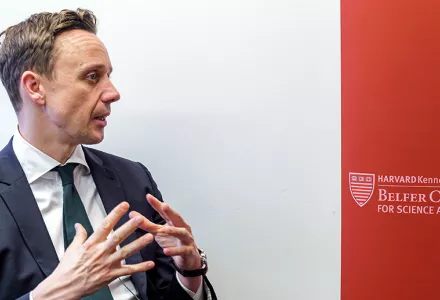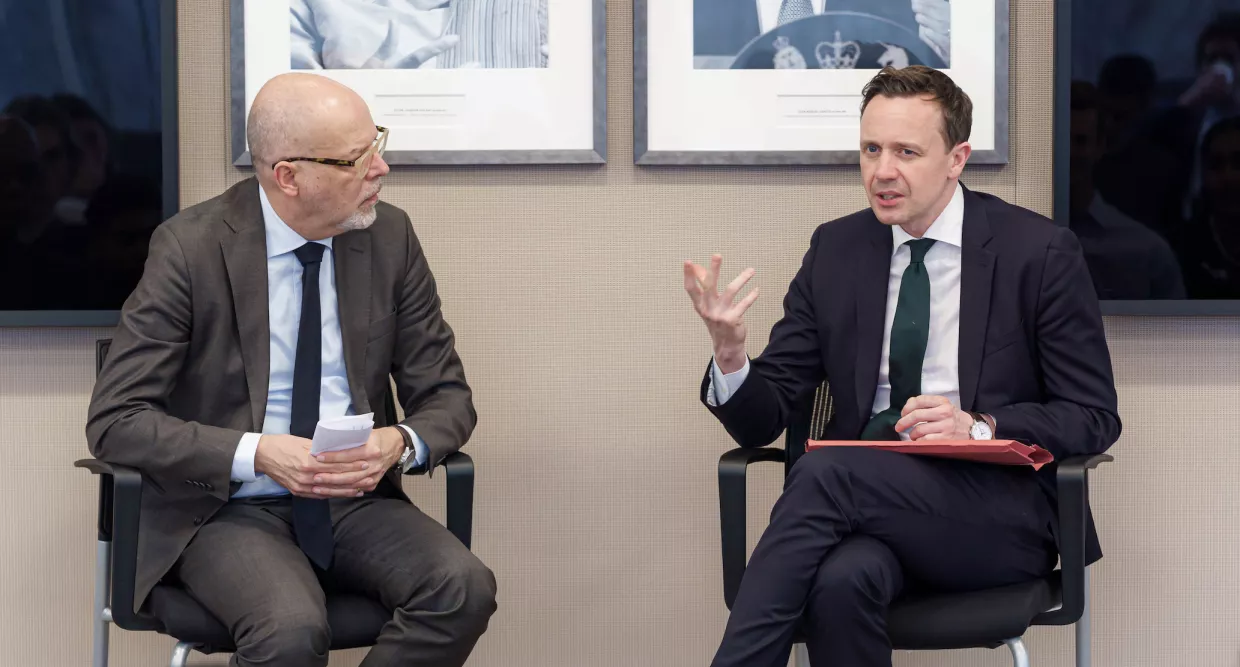
To commemorate the 25th Anniversary of the Good Friday Agreement, Shannon Felton Spence spoke with John Bew, 10 Downing Street Head of Foreign Affairs and Integration Review Policy Unit. Professor Bew works across foreign affairs, defense, and Northern Ireland policy as Special Advisor to the British Prime Minister. He grew up in Belfast, Northern Ireland, and his father, Lord Bew, was a key figure in advising Nobel Peace Prize winner and unionist leader David Trimble.
The following is a transcript of a conversation on March 23, 2023.
Shannon Felton Spence:
Next month marks the 25th anniversary of the Good Friday Agreement. What made this particular peace negotiation so complex?
John Bew:
The Good Friday Agreement came after 30 years of violence in Northern Ireland—what we refer to as “The Troubles”—during which more than 3,500 people were killed and many more injured. There was massive damage to commercial property, and the conflict posed an enormous security challenge for the British state.
There had been many attempts over the years to launch political processes aimed at creating stability—efforts to find a formula that would gain sufficient consensus to remove the conditions for violence. These included All Party Talks and negotiations involving the UK and Irish governments, sometimes with support from external actors like the U.S., especially during the 1990s.
The honest, historian’s answer is that context is everything. By 1998, a number of factors aligned that hadn’t before. One key element was political leadership—especially from local politicians who had long been involved in the process.
David Trimble, from the unionist community, and John Hume, from the nationalist community, were absolutely essential. They both made difficult, even uncomfortable, compromises on behalf of their communities. Their leadership rightly earned them the Nobel Peace Prize. They were the most important figures in getting their communities to support the deal.
Then there were international actors. The U.S. played a significant role. But after Trimble and Hume, I’d say Tony Blair, the British Prime Minister, and Bertie Ahern, the Irish Taoiseach, were crucial. Their leadership brought momentum and weight to the process.
You also had evolving circumstances: a shifting security situation, a changing economic environment, and years of groundwork through prior talks. These converged in 1998 in a way they hadn’t since the conflict began in the late 1960s—and that made it possible to finally get over the line.
Shannon Felton Spence:
And speaking of political personalities—there’s something often noted about the dynamic between Ahern, Blair, and Clinton. They were aligned, forward-looking, and politically strong. How much did that matter in making 1997–1998 the right moment to push for peace?
John Bew:
It mattered quite a bit. Take Tony Blair, for example—he had just won a landslide victory in 1997, completely transforming the political landscape in the UK. That gave him enormous political capital. He also had a broader devolution agenda, returning power to Scotland and Wales. So the Northern Ireland process wasn’t seen in isolation—it was part of a wider push for constitutional reform. That helped.
Because of his strong mandate, Blair had the bandwidth to really focus on Northern Ireland. In fact, his chief of staff estimated that he spent 40% of his first year in office on Northern Ireland. That level of attention was unprecedented.
Crucially, the relationship between Blair and Ahern was very effective—unlike previous British-Irish pairings, like Thatcher and Haughey in the 1980s, which were far more strained.
Ahern also made bold, historic decisions—breaking with some of Ireland’s traditional constitutional positions, even amending the Irish constitution’s territorial claims over Northern Ireland. These were pivotal moves that helped bring unionists on board in ways previous Irish leaders hadn’t. Both men showed statesmanship when it counted.
If I had to name the four key figures of the Agreement, they’d be Trimble, Hume, Blair, and Ahern.
Of course, President Clinton was also important, as was Senator George Mitchell, who chaired the talks, and General John de Chastelain, who oversaw the decommissioning process. But fundamentally, this was a Northern Irish conflict with British-Irish dimensions—and it was resolved when the UK and Irish governments, along with local leaders, got those dimensions right. The U.S. stepped in very effectively at critical moments.
Shannon Felton Spence:
Today, the Good Friday Agreement is often held up by the UN and others as one of the most successful peace processes in the world. That’s due in part to its inclusivity, but also its emphasis on reconciliation. How did the agreement lay the groundwork for healing Northern Irish society in the years that followed?
John Bew:
First and foremost, the Agreement ended the violence—and that alone was transformative. The cessation of violence removed the single most divisive and destabilizing factor in society at the time.
That said, it’s important to acknowledge that reconciliation since 1998 has been complicated and incomplete. Schools remain largely segregated. Politics in Northern Ireland is still highly polarized. So while the violence ended, many of the divisions persisted.
There’s still debate about how much genuine reconciliation has occurred. For instance, the agreement required the release of paramilitary prisoners—many of whom were responsible for horrific acts. That made it difficult for some communities to move on.
Symbolically, there was a powerful moment in the aftermath of the agreement—Bono holding hands with Trimble and Hume at a concert. But the truth is, the years that followed were messy. Moderate parties on both sides began to lose ground to more extreme ones. But the framework of the Agreement endured, and eventually those more hardline parties entered that framework and began operating within it.
So the real achievement was structural: a framework that could withstand political shifts and still maintain peace.
It's not a neat or perfect story. Reconciliation has been limited. But again, the end of violence—that’s a profound shift. It brought stability, protected individual rights, and respected the identities of both communities. That alone made it one of the most significant political accomplishments of the modern era.
Shannon Felton Spence:
There’s something quite famous about the dynamic between Ahern, Blair, and Clinton—how they got on, how forward-looking they were. And they each had significant political capital at the time. How much of that made 1997–1998 the right moment to go for peace?
John Bew:
It made a big difference, especially in the UK context. For example, Tony Blair had just won a landslide election in 1997, reshaping British politics overnight. He also had a broader devolution agenda, establishing local parliaments in Scotland and Wales. So Northern Ireland wasn’t seen as a separate issue—it was part of a wider constitutional transformation.
Because of his strong majority, Blair had the political space to dedicate significant time to the peace process. In fact, his chief of staff later estimated that Blair spent about 40% of his first year in office focused on Northern Ireland. That’s extraordinary—and a level of attention that hadn’t been given before.
Also important was the strength of the relationship between Blair and Ahern. That wasn’t always the case with British and Irish leaders—think back to the frosty dynamic between Margaret Thatcher and Charlie Haughey in the 1980s. Blair and Ahern, by contrast, worked very effectively together.
Ahern made some bold decisions—most notably, amending the Irish constitution to soften its territorial claim on Northern Ireland. That broke with decades of Irish state orthodoxy and helped bring unionists to the table. These were real acts of political courage.
So, if you asked me to name the four key figures of the Good Friday Agreement, I’d say David Trimble, John Hume, Tony Blair, and Bertie Ahern.
Of course, President Clinton played a critical supporting role, as did Senator George Mitchell, who chaired the talks, and General John de Chastelain, who led the decommissioning process. The U.S. leaned in at key moments and provided essential support. But fundamentally, this was a Northern Irish conflict with UK-Irish dimensions. The resolution came when those core relationships were finally made to work—and the U.S. helped at exactly the right times.
Shannon Felton Spence:
Today, the UN holds up the Good Friday Agreement as one of the most successful peace models globally. That’s partly due to how inclusive the process was—but also the post-agreement emphasis on reconciliation. How did the agreement set the stage for a divided society to begin healing?
John Bew:
The most important thing is that the Agreement ended the violence. That alone was transformative. Up to that point, violence was the most divisive and destabilizing force in Northern Irish society.
That said, there’s an ongoing debate about how much real reconciliation has occurred since 1998. The school system is still largely segregated, and politics remains starkly divided. The peace process was never going to be a neat or perfect solution.
Like any major peace agreement, the Good Friday Agreement left unresolved issues—how to deal with the legacy of the past, for example, or what to do about the release of paramilitary prisoners, many of whom were responsible for horrific acts. Those decisions were necessary for peace, but they made reconciliation deeply complicated.
There’s a well-known moment when Bono brought Trimble and Hume on stage and held their hands in a symbolic show of unity. But the reality that followed was more difficult. After 1998, the moderate parties—moderate nationalists and unionists—started losing ground to more extreme voices. That shift was partly due to continued tension and frustration on the ground.
Over time, though, even those on the political extremes moved toward the center and began operating within the framework of the Agreement. That’s one of its structural achievements.
So yes, it’s messy and complex, and we should be careful not to romanticize it. Reconciliation remains limited. But the absence of violence? That changed everything. It brought stability. It safeguarded rights. And it created space for peaceful coexistence and for both communities’ identities to be respected. That’s the legacy of the Agreement.

Shannon Felton Spence:
An entire generation has now grown up without the violence of The Troubles. While it’s in the history books, how do we ensure that peace remains a priority for the future?
John Bew:
Ultimately, the responsibility lies with the British and Irish governments. They are co-guarantors of the Good Friday Agreement, which means it's their job to protect and uphold it. The UK government, as the sovereign authority, has specific responsibilities to ensure that the economic rights and identities of all communities in Northern Ireland are respected.
It’s about maintaining the commitments that were laid out in the Agreement and preserving the delicate balance it created—a balance between the aspirations of different communities. Increasingly, there’s also a third, more centrist political force emerging in Northern Ireland, which wasn’t well represented in 1998. That raises the question of whether the institutions need to be reformed or adapted. Like all constitutional settlements, the Good Friday Agreement requires ongoing management, periodic reform, and careful iteration.
What’s critical is maintaining two things: first, the balance that’s built into the Agreement, and second, the three interlocking strands it established.
- Strand One covers the internal power-sharing arrangements in Northern Ireland.
- Strand Two addresses North–South relations on the island of Ireland.
- Strand Three governs East–West relations between the UK and Ireland.
At times, people have felt that one strand was being prioritized over the others, but the Agreement makes clear that all three are equally important and interconnected. Preserving that balance is essential.
There are debates now about reforming the institutions, and while there’s a case for it, the Agreement is so finely crafted that reform risks upsetting the very equilibrium that sustains it. The institutions themselves have faced challenges—they’ve only functioned for about half of the time since 1998. For years, Sinn Féin refused to participate in government; now, it’s the DUP that is withholding participation. It’s a complex system that requires patient, steady stewardship.
Shannon Felton Spence:
So where do you think things stand today? Are you optimistic?
John Bew:
I remember voting in the 1998 referendum—I won’t reveal my age, but it was my first vote—and I recall the lead-up to it vividly. What came before was a very dark time.
That context gives me real optimism. I go back to Belfast regularly—my family is still there—and the transformation is extraordinary. The quality of life, the restaurant culture, the vibrancy of the city center—it’s a completely different place. Back then, the city center felt empty and under threat. There was a heavy police and military presence due to the risk of bombings. That’s all gone now. Today, Belfast is a pretty normal UK city, and that normality is a huge achievement.
Northern Ireland today is relatively stable, prosperous, and secure—especially compared to many places around the world. People there sometimes find the international attention a bit puzzling, given how normal life now feels. But that attention isn’t a bad thing—it’s a reminder of how far we’ve come.
It’s unquestionably a better place than it was in the 25 years before the Agreement. That earlier period was grim, divided, and deeply tragic. Anyone who lived through both eras will tell you the same. And if you look at younger generations and polling data, there’s real respect for what was achieved in 1998—even among those who weren’t alive at the time.
Of course, challenges remain—sectarian divisions persist, and the political structures still face pressure. But beyond that, people care most about the everyday things: healthcare, policing, public services. These are the issues that matter now, and they’re where political focus is needed. That’s the next step: ensuring peace delivers a better quality of life.
Shannon Felton Spence:
Okay, last one. You’re back at your hotel, it’s been a long day, and you turn on Netflix. Are you going with Derry Girls, The Crown, or Love Island UK?
John Bew:
Derry Girls took me a while to watch, but it’s brilliant. It’s set in my school years, so I recognize a lot—the music, the local media clips, even a plotline about a lion escaping from Belfast Zoo, which actually happened!
That final episode, where they vote in the 1998 referendum—that was my exact year. It’s hard not to feel a deep connection to it. And it’s not too sentimental or heavy-handed, which wouldn’t suit Northern Ireland. It does get a little more emotional in the third series, but overall, it’s just funny, silly, and normal—which really captures what life was like.
I haven’t watched The Crown. And I won’t say too much about Love Island UK... but I actually quite like it. I didn’t watch the winter season, though.
Shannon Felton Spence:
Neither did I. I’m still heartbroken about Liam and Millie.
John Bew:
Oh, yeah—Liam and Millie! I remember that season well.
Felton Spence, Shannon. “The Significance of the Good Friday Agreement, a Q&A with John Bew.” Belfer Center for Science and International Affairs, Harvard Kennedy School, March 27, 2023


